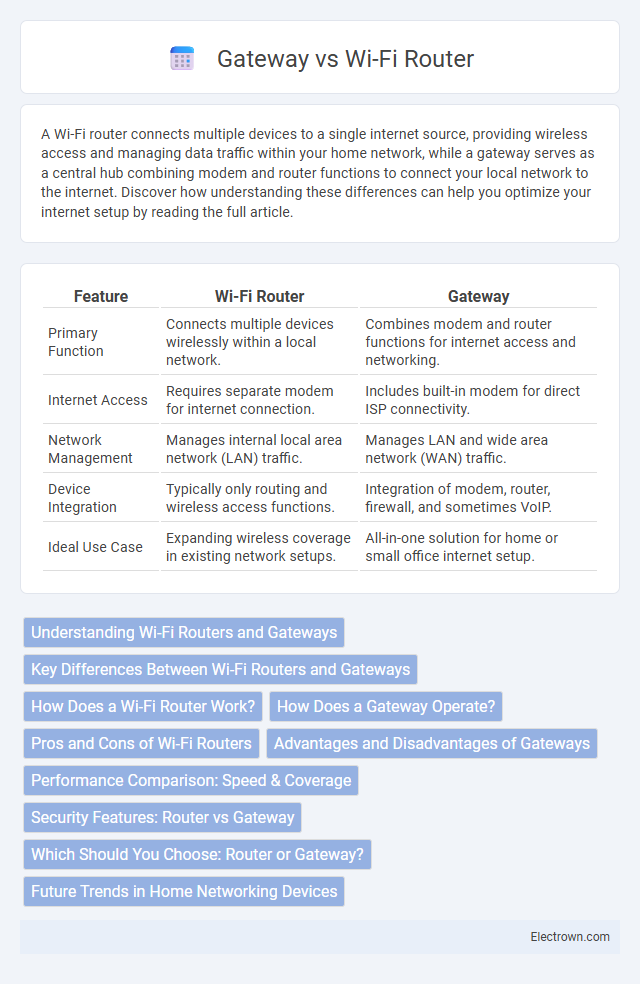A Wi-Fi router connects multiple devices to a single internet source, providing wireless access and managing data traffic within your home network, while a gateway serves as a central hub combining modem and router functions to connect your local network to the internet. Discover how understanding these differences can help you optimize your internet setup by reading the full article.
Table of Comparison
| Feature | Wi-Fi Router | Gateway |
|---|---|---|
| Primary Function | Connects multiple devices wirelessly within a local network. | Combines modem and router functions for internet access and networking. |
| Internet Access | Requires separate modem for internet connection. | Includes built-in modem for direct ISP connectivity. |
| Network Management | Manages internal local area network (LAN) traffic. | Manages LAN and wide area network (WAN) traffic. |
| Device Integration | Typically only routing and wireless access functions. | Integration of modem, router, firewall, and sometimes VoIP. |
| Ideal Use Case | Expanding wireless coverage in existing network setups. | All-in-one solution for home or small office internet setup. |
Understanding Wi-Fi Routers and Gateways
Wi-Fi routers manage data traffic between your devices and the internet by directing wireless signals within your home network, while gateways combine the functions of a router and a modem, serving as a single device that connects your local network to your internet service provider. Understanding that gateways handle internet access and network routing simultaneously can simplify setup and reduce equipment clutter. Your choice depends on whether you prefer integrated hardware or separate components for flexibility and potential performance benefits.
Key Differences Between Wi-Fi Routers and Gateways
Wi-Fi routers primarily manage wireless network traffic by connecting multiple devices within a local network, while gateways serve as a central hub that combines a router, modem, and often a firewall, facilitating communication between the local network and the internet. Key differences include functionality, with gateways providing integrated internet access and network management, whereas routers focus on routing data between devices. Understanding these distinctions helps you choose the right device for your home or office network setup.
How Does a Wi-Fi Router Work?
A Wi-Fi router functions by connecting to your modem and broadcasting wireless signals, allowing multiple devices to access the internet simultaneously. It manages data traffic between your home network and the internet, assigning unique IP addresses to each connected device for efficient communication. Understanding how your Wi-Fi router operates can help optimize your network performance and security.
How Does a Gateway Operate?
A gateway operates by connecting multiple networks, often linking your home or office network to the internet, performing critical functions such as routing, firewall protection, and network address translation (NAT). Unlike a basic Wi-Fi router, a gateway integrates modem capabilities, enabling communication between different protocols and managing data flow efficiently. This combined functionality ensures your devices maintain seamless, secure internet access while controlling incoming and outgoing traffic.
Pros and Cons of Wi-Fi Routers
Wi-Fi routers offer the advantage of flexible network management and compatibility with various internet service providers, allowing you to customize your home network settings for optimal performance. However, they require a separate modem, which can add complexity and cost to your setup. The main drawback is potential signal interference and limited range compared to gateways, which combine modem and router functions into a single device.
Advantages and Disadvantages of Gateways
Gateways combine the functionality of a modem and a router, simplifying your home network setup by reducing the number of devices needed. They offer advantages such as easier installation, centralized management, and potentially lower costs, but may lack the flexibility and advanced features of standalone routers. Disadvantages include limited customization, potential performance constraints, and dependency on a single device, which can affect network reliability if the gateway fails.
Performance Comparison: Speed & Coverage
Wi-Fi routers typically offer faster speeds with advanced technologies like MU-MIMO and beamforming, optimizing data transmission for multiple devices and expanding coverage efficiently within a home or office. Gateways combine modem and router functionalities but may have slightly lower performance in speed and coverage due to integrated hardware limitations and signal interference. For environments requiring maximum speed and extensive Wi-Fi range, standalone routers generally outperform gateways in delivering reliable and high-quality wireless connectivity.
Security Features: Router vs Gateway
Wi-Fi routers primarily offer basic security features like WPA3 encryption and firewall protection to safeguard your home network. Gateways, however, integrate advanced security protocols such as intrusion detection systems, automatic firmware updates, and built-in VPN support for enhanced protection. Choosing a gateway ensures your network benefits from comprehensive security measures, safeguarding your devices from evolving cyber threats.
Which Should You Choose: Router or Gateway?
Choosing between a Wi-Fi router and a gateway depends on your network needs and existing equipment. A router connects multiple devices within your home network and manages data traffic, while a gateway combines a modem and router in one device, simplifying setup by providing internet access and network management. Your decision should consider whether you prefer an all-in-one solution with a gateway or separate components for more control, as the gateway is ideal for straightforward setups and routers offer flexibility for advanced configurations.
Future Trends in Home Networking Devices
Wi-Fi routers and gateways are evolving rapidly to support faster speeds, enhanced security, and seamless device integration in smart homes. Mesh networking and Wi-Fi 6E technology are becoming standard features, ensuring improved coverage and reduced interference for Your connected devices. Future home networking devices will prioritize AI-driven management and automation, simplifying network control and boosting overall performance.
Wi-Fi Router vs Gateway Infographic

 electrown.com
electrown.com